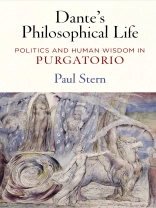When political theorists teach the history of political philosophy, they typically skip from the ancient Greeks and Cicero to Augustine in the fifth century and Thomas Aquinas in the thirteenth, and then on to the origins of modernity with Machiavelli and beyond. Paul Stern aims to change this settled narrative and makes a powerful case for treating Dante Alighieri, arguably the greatest poet of medieval Christendom, as a political philosopher of the first rank.
In Dante’s Philosophical Life, Stern argues that Purgatorio’s depiction of the ascent to Earthly Paradise, that is, the summit of Mount Purgatory, was intended to give instruction on how to live the philosophic life, understood in its classical form as ‘love of wisdom.’ As an object of love, however, wisdom must be sought by the human soul, rather than possessed. But before the search can be undertaken, the soul needs to consider from where it begins: its nature and its good. In Stern’s interpretation of Purgatorio, Dante’s intense concern for political life follows from this need, for it is law that supplies the notions of good that shape the soul’s understanding and it is law, especially its limits, that provides the most evident display of the soul’s enduring hopes.
According to Stern, Dante places inquiry regarding human nature and its good at the heart of philosophic investigation, thereby rehabilitating the highest form of reasoned judgment or prudence. Philosophy thus understood is neither a body of doctrines easily situated in a Christian framework nor a set of intellectual tools best used for predetermined theological ends, but a way of life. Stern’s claim that Dante was arguing for prudence against dogmatisms of every kind addresses a question of contemporary concern: whether reason can guide a life.
Tabla de materias
Chapter 1. Politics, Poetry, and Philosophy in Purgatorio
Chapter 2. ‘What Good Would Climbing Do?’: The Rationale and Impetus for the Pursuit of Self-Knowledge (Cantos I-IX)
Chapter 3. ‘To a Better Nature You Lie Subject’: The Political Character of Humanity and Nature (Cantos X-XVII)
Chapter 4. Disrobing the Siren: The Zealous Pursuit of Clarity (Cantos XXVII-XIX)
Chapter 5. ‘When Love Breathes Within Me’: The Desirability of Desire (Cantos XIX-XXVII)
Chapter 6. ‘The Nest for Human Nature’: Earthly Paradise and the ‘Happiness in This Life’ (Cantos XXVIII-XXXIII)
Chapter 7. Dante’s Human Wisdom
Notes
Index
Acknowledgments
Sobre el autor
Paul Stern is Professor of Politics at Ursinus College and author of Knowledge and Politics in Plato’s Theaetetus.












